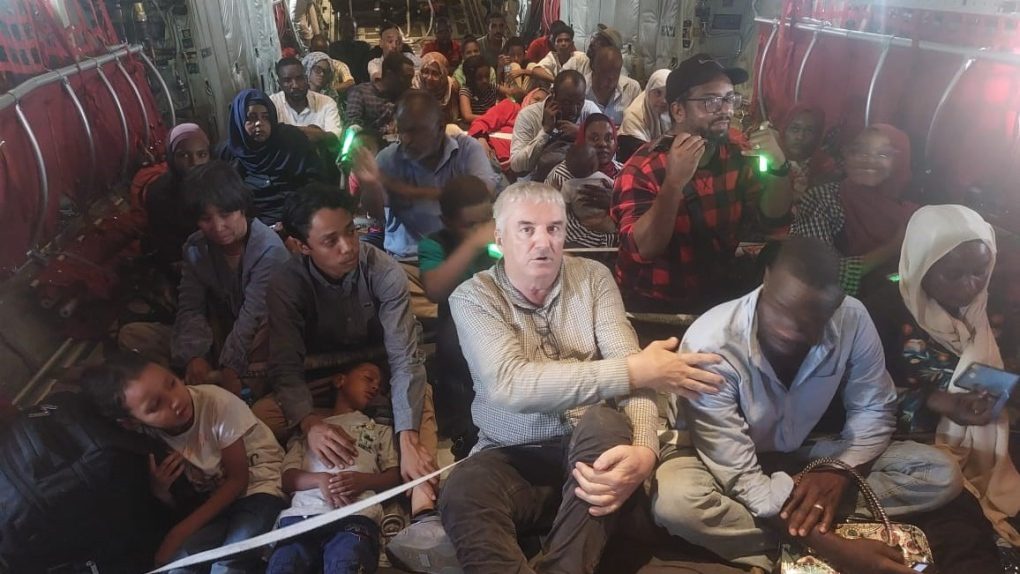Global Courant 2023-05-05 05:15:06
The first sign that Sudan was on the brink of civil war was when bombings broke out in Khartoum just after 9am local time on April 15. Canadian mining consultant Colin Crane heard the explosions from his machine shop and immediately got an ominous feeling.
“I had never been scared in Sudan until then,” said 62-year-old Crane, who told CTV News of his ordeal from his home in Edmonton after flying out of Sudan on the Canadian Forces’ first flight.
He had worked in the northeastern African country for more than two decades, searching for gold and oil, and was used to the loud protests that would occasionally take over the capital, but the sound of machine gun fire punctuating the air made him nervous.
Khartoum was gripped by urban warfare as the Sudanese army battled the Rapid Support Force – a militia group – for control of the country. The streets of the capital were ground zero in their struggle.
When the first explosions were heard, Crane hurried to collect his work equipment and hurried home. In his rush to get to the safety of his apartment, he left behind his Canadian passport.
Crane lived in the Jabra district of Khartoum. When he returned to his apartment, he heard gunshots and heavily armed Sudanese government soldiers chasing guards from his residence. Crane said he barricaded himself in his apartment, bought extra data on his cell phone and emailed the Canadian embassy in Khartoum for help.
“I am currently in my seat… I would like to be notified if an evacuation is planned for Canadian citizens,” Crane wrote in an email he sent to CTV News.
The next day, as artillery fire and airstrikes rained down on Khartoum, he moved to a hotel with more security and relied on his Sudanese colleagues to help him stock up on food and water.
Emails from Global Affairs Canada (GAC), which Crane shared with CTV News, showed that the department provided him with little information other than to confirm that he was registered for alerts. Crane was advised to stay away from windows, make sure he had essentials with him, and always keep his phone charged.
While he waited for more details from GAC, power and water to the hotel were cut and the City Plaza mall in his neighborhood was shelled.
“They shelled the mall with heavy artillery. It lasted about 16 hours,” he said.
Crane hid in his hotel bathroom during the blasts and captured video of dark plumes of smoke billowing from the mall. He was afraid that an errant bomb would destroy his building, or that the guards stationed in the lobby would be attacked by looters. African media reported that thousands of prisoners had escaped from prison. He watched Indian nationals board shuttles sent by their government to take them out of the city at his hotel.
Then, 10 days after they first made contact with GAC, an email arrived with vague plans for an evacuation just after a tentative ceasefire was reached.
The April 25 email from GAC’s SOS account said it was prepared to leave at short notice and stated that only Canadians with valid passports would be eligible for flights, but there were no guaranteed seats. Canada had not yet set up its own evacuation flights and relied on allies such as Germany, the Netherlands, Sweden, Norway and France.
Canadians were also told to make their own way to Wadi Seidna Air Base to get on rescue flights.
“Global Affairs Canada cannot provide advice or recommendations for safe transportation… (and) cannot guarantee a seat on specific flights as these are offered by allied/like-minded countries.”
The email also came with a candid warning:
“The security situation is highly unstable. There are reports of looting of private homes. There are also reports of assaults and assaults, including rape. Foreigners and personnel of international organizations have been targeted,” the email reads.
“It wasn’t very reassuring. It felt like we were on our own,” said Crane. But luckily for the consultant, his local contacts were willing to help, and although the banks were closed, he had cash on hand.
After his driver retrieved his passport from his workplace, Crane attempted to hire a taxi to take him to Wadi Sayyidna Air Force Base on April 26, but they were too scared to travel. So he flagged down a truck driver and offered him $400 to take him on the roughly 15-mile trip to the airport. During the three-hour drive, Crane said they passed more than 20 checkpoints. He saw soldiers carrying Kalashnikovs, artillery on the back of pick-up trucks and even tanks as they drove out of the devastated city.
“There were so many damaged cars and destroyed buildings,” said Crane. “There was so much devastation.”
Crane arrived at the airbase in time to spend a restless night in a hangar among hundreds of foreigners. He awoke at 5am the next morning only to be told that the only flights departing were reserved for British citizens. Later that morning on April 27, two Canadian Hercules transport planes landed. By noon, Crane was airlifted to Djibouti, where he and dozens of other passengers were greeted by the Canadian ambassador to Sudan. Eight hours later they were transferred on a commercial flight to Nairobi, Kenya. From there, Crane bought a flight to Edmonton via Denver, Colorado.
The Canadian government conducted a total of six evacuation flights from Sudan, carrying nearly 550 passengers. About 175 were Canadian. GAC says more than 200 other citizens and permanent residents have been deported on flights offered by allies.
The government also provided $274,283 in financial assistance to 108 individuals to help them pay for flights to Canada from a safe third country.
Now safely home, Crane says he believes the government did its best under extreme circumstances.
“I wish there was better communication, but the military did a great job with the short time they had to coordinate flights. There’s a lot going on behind the scenes to land these flights,” said Crane.
The mining consultant says he wants to return to Sudan soon to continue his work, but in the meantime he wants to raise money to help the Sudanese nationals who brought him to safety.








